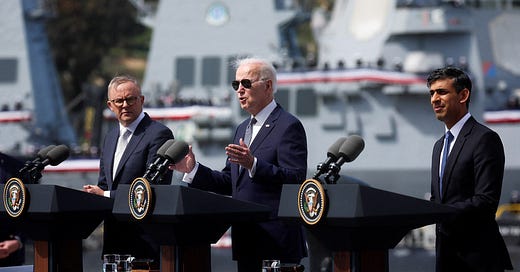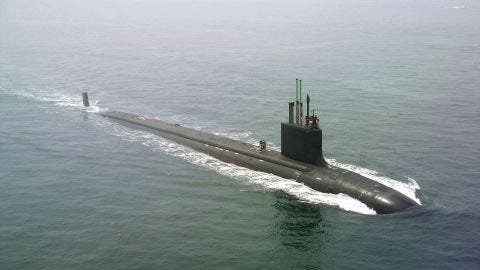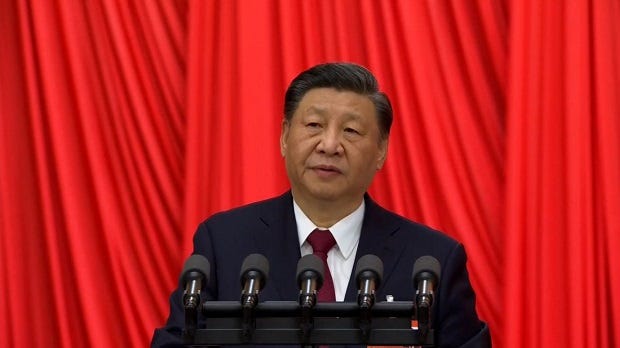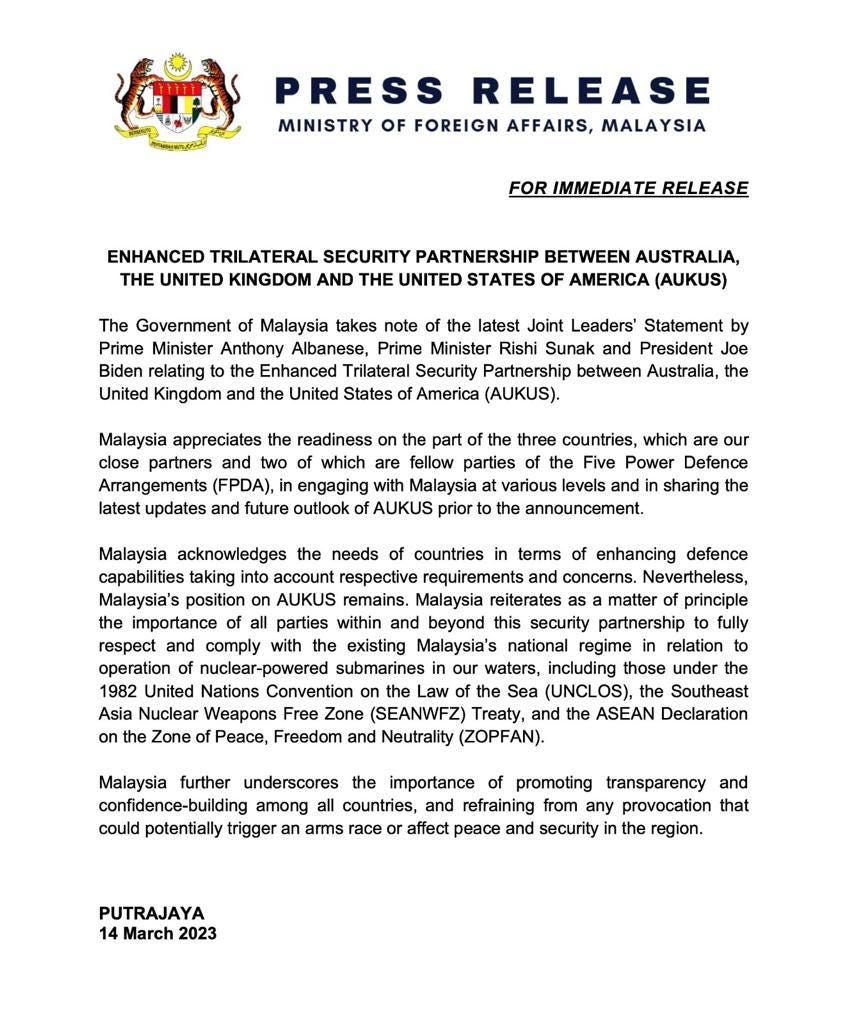Indonesian and Malaysian concerns over AUKUS
Operating nuclear submarines from HMAS Stirling naval base near Perth will increase military surveillance off Australian coastline
Australian prime minister Anthony Albanese, UK prime minister Rishi Sunak, and US president Joe Biden, publicly announced an implementation timetable for the AUKUS agreement, which until this week had been very abstract.
Under the plan, there would be a combined fleet of nuclear-powered submarines operating from the HMAS Stirling naval base, near Perth, Western Australia. In the joint statement,
· From 2023, US nuclear-powered subs will increase port visits to Australia, joined three years later by more visits from British nuclear-powered subs. Australian submariners would be trained.
· In 2027, the US and UK subs will start rotations at HMAS Stirling, that is set to receive a multibillion dollar upgrade.
· From the early 2030s, pending Congress approval, Australia will buy three Virginia-class submarines from the US, with an option to buy two more.
· During the 2030s, the UK plans to build its first AUKUS nuclear-powered submarine – combining its Astute-class submarine with US combat systems and weapons.
· In the early 2040s, Australia will deliver the first of its domestically built and constructed AUKUS subs to its Royal Australian Navy.
The US and UK will provide Australia with the nuclear material to operate the submarines without the need to refuel. Australia doesn’t have the capability to enrich nuclear material to weapons grade, as the Australian submarines will only carry conventional weapons, and plans to abide by the International Atomic Energy Agency (IAEA) principles on non-proliferation.
The AUKUS agreement firs announced by the Morrison in 2021 has set Australia on this trajectory, which will dominate Australian defense policy and strategy for the next 30 years. Its based upon a doctrine of forward containment, and to supplement the US presence in the region.
At the time, there wasn’t any full debate over why Australia needs to take part in the containment of Chinese military presence in the region, when there were other options, notably more cost effective options available. Most of Australia’s neighbors within South-East Asia have opted to be neutral within a region of strategic competition between China and the US. China has accepted, and respected this approach, which allows countries within the region to carry on cordial relations with both military powers.
The cost/benefit analysis of spending AUD $368 billion in the AUKUS commitment can be seen differently, through varying the assumptions behind the commitment. There is also the risk that by the time the AUKUS plan is actually rolled out, the strategic defense requirements of Australia, might well be very different from today.
Chinese reaction
China’s president Xi Jinping speaking at the recent party congress, just after his election for his third term as president said ‘Western countries – led by the US – have implemented all-round containment, encirclement, and suppression against us, bringing unprecedently severe challenges to the country’s development’.
President Xi, just after the AUKUS meeting in San Diego pledged that China would bolster the nation’s military. Xi said ‘we must build the Peoples’ Revolutionary Army into a great wall of steel that effectively safeguards natural sovereignty, security and development’.
Xi said that China has suffered enough at the hands of ‘bullying foreign powers’.
Chinese foreign ministry spokesperson Wang Wenbin said that AUKUS partners have completely ignored the concerns of the international community and gone further down a wrong and dangerous path.
Some commentators believe, this is going to stimulate an arms race within the region, where the waters around Australia will now see much more activity by Chinese vessels surveilling AUKUS submarine arrivals and departures.
Australia’s concerned neighbors
Although many Australians support the AUKUS initiative, governments, think tanks, and academics around the region have differing opinions on the Chinese threat. Countries like Indonesia, Malaysia, Singapore, Thailand, and the rest of ASEAN have lived with Chinese presence for over a thousand years. They tend to take a very even-handed approach to superpower rivalry within the region.
Indonesia, a day after the AUKUS San Diego meeting said ‘Indonesia has been closely following the security partnership of AUKUS, particularly the announcement on the pathway to achieve AUKUS critical capability. Maintaining the peace and stability of the region is the responsibility of all countries. It is critical for all countries to be part of the effort’.
The Indonesian foreign ministry went on further to express their concern that nuclear weapons may in the future enter the AUKUS agenda with its statement ‘Indonesia expects Australia to remain consistent in fulfilling its obligations under the NPT and IAEA safeguards, as well as develop a verification mechanism that is effective, and transparent’.
Malaysia’s new prime minister Anwar Ibrahim reinforced the previous government’s stand on the AUKUS agreement. A Foreign Ministry press statement said that Malaysia maintains its policy and wants all parties to fully respect and comply with the existing regime in relations to the operation of nuclear powered submarines in Malaysia’s waters. These include the 1982 United Nations Convention on the Law of the Sea, the Southeast Asia Nuclear Weapons Free Zone Treaty, and the ASEAN Declaration on the Zone of Peace, Freedom, and Neutrality.
Malaysia further highlights the importance of promoting transparency and confidence building among all countries and reframing from any provocation that could potentially trigger an arms race or affect peace and stability in the region.
Cold War getting hotter
Comments from both Beijing and Washington are becoming much more aggressive in recent weeks, with talk from the US about war as being not just a probability, but a real possibility. While China has not ruled out taking Taiwan by military force, the US appears to be abandoning its doctrine of strategic ambiguity over Taiwan. China views US bases in the region as encirclement, the Monroe Doctrine in reverse.
However, China sees war in a different way to the US. The Belt and Road Initiative is bringing China closer to Russia, Central Asia, the MENA, and Europe in trade. China is beginning to play a diplomatic role in the Russia-Ukraine war, and China is abandoning the US Dollar as a means of trade.
Most importantly, AUKUS has ruffled Australia’s neighbors’ feathers. Its clear by Indonesian and Malaysian statements, that prime minister Albanese didn’t brief these countries in advance. This is a lose of face for both Indonesia and Malaysia. Without the cooperation of Indonesia, the transit of Australian nuclear submarines to the South China Sea will be just that little more difficult.
Albanese may have had a good time mixing with Rishi Sunak and Joe Biden in San Diego. Albanese now has to repair the diplomatic damage done last week with his neighbors. China won this round of diplomacy, and Australia didn’t even see it.
Originally published in the Eurasia Review 17th March 2023
Subscribe Below:








Since Admiral Cheng Ho sailed to Malacca in the 14th-15th centuries, the Chinese could have taken over these countries, but it did not, because it wanted trade more then conquering and governing other countries, knowing that keeping colonies will drain your own country's treasury.
Australian's policy makers should have thought of this historical fact. Just sell your Australian produce to China's billions of consumers. Your wine industry will prosper. You will never be impoverished when you trade and not fight. Anyhow there is no way that Australia can conquer China, with American and British help.
Khoo Soo Hay, B.A., UNE, Armidale , Australia.
Penang, Malaysia.